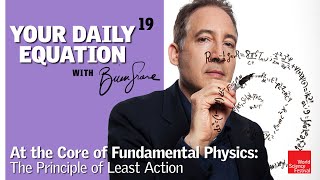
Variational Principle Introduction
In this video, I introduce the variational principle in quantum mechanics, how it is derived, and why you might want to use it. Hope you found this video helpful, please post in the comments below anything I can do to improve future videos, or suggestions you have for future videos. This
From playlist Quantum Mechanics

Differential Equations | Variation of Parameters.
We derive the general form for a solution to a differential equation using variation of parameters. http://www.michael-penn.net
From playlist Differential Equations

Free ebook http://tinyurl.com/EngMathYT I show how to solve differential equations by applying the method of variation of parameters for those wanting to review their understanding.
From playlist Differential equations

C29 Variation of parameters Part 2
I continue with an explanation of the method of variation of parameters.
From playlist Differential Equations

Introduction to Direct Variation, Inverse Variation, and Joint Variation
Please Subscribe here, thank you!!! https://goo.gl/JQ8Nys Introduction to Direct Variation, Inverse Variation, and Joint Variation
From playlist 3.7 Modeling Using Variation

A16 The method of variation of parameters
Starting the derivation for the equation that is used to find the particular solution of a set of differential equations by means of the variation of parameters.
From playlist A Second Course in Differential Equations

A18 Example problem using variation of parameters
An example problem using the method of variation of parameters to solve a non homogeneous system of differential equations.
From playlist A Second Course in Differential Equations

Variation of Parameters for Systems of Differential Equations
This is the second part of the variation of parameters-extravaganza! In this video, I show you how to use the same method in the last video to solve inhomogeneous systems of differential equations. Witness how linear algebra makes this method so elegant!
From playlist Differential equations

Variation of parameters to solve differential equations
Free ebook http://tinyurl.com/EngMathYT How to use the method of variation of parameters to solve second order ordinary differential equations with constant coefficients. Several examples are discussed.
From playlist Differential equations

Noether's theorems and their growing physical relevance by Joseph Samuel
DATES: Monday 29 Aug, 2016 - Tuesday 30 Aug, 2016 VENUE: Madhava Lecture Hall, ICTS Bangalore Emmy Noether (1882-1935) is well known for her famous contributions to abstract algebra and theoretical physics. Noether’s mathematical work has been divided into three ”epochs”. In the first (
From playlist The Legacy of Emmy Noether

06: Hamilton´s principles - Part 2
Jacob Linder: 18.01.2012, Classical Mechanics (TFY4345), v2012 NTNU A full textbook covering the material in the lectures in detail can be downloaded for free here: http://bookboon.com/en/introduction-to-lagrangian-hamiltonian-mechanics-ebook
From playlist NTNU: TFY 4345 - Classical Mechanics | CosmoLearning Physics

Lec 7 | MIT 3.320 Atomistic Computer Modeling of Materials
Technical Aspects of Density Functional Theory View the complete course at: http://ocw.mit.edu/3-320S05 License: Creative Commons BY-NC-SA More information at http://ocw.mit.edu/terms More courses at http://ocw.mit.edu
From playlist MIT 3.320 Atomistic Computer Modeling of Materials

13. The Einstein field equation (variant derivation).
MIT 8.962 General Relativity, Spring 2020 Instructor: Scott Hughes View the complete course: https://ocw.mit.edu/8-962S20 YouTube Playlist: https://www.youtube.com/playlist?list=PLUl4u3cNGP629n_3fX7HmKKgin_rqGzbx A second route to the Einstein field equation, using a variational principle
From playlist MIT 8.962 General Relativity, Spring 2020

Your Daily Equation #19 : At the Core of Fundamental Physics: The Principle of Least Action
Episode 19 #YourDailyEquation: All fundamental laws of physics share a reliance on a single principle: The Principle of Least Action. In this episode of Your Daily Equation, Brian Greene explains this principle in the simplest example and shows how it yields the basic laws of motion introd
From playlist Your Daily Equation with Brian Greene

François Gay-Balmaz : A Langrgian Variational Formulation of Nonequilibrium thermodynamics
Recording during the thematic meeting : "Geometrical and Topological Structures of Information" the August 30, 2017 at the Centre International de Rencontres Mathématiques (Marseille, France) Filmmaker: Guillaume Hennenfent
From playlist Geometry

Hydrodynamics, variational principles and integrability (Pedagogical Lecture 3) by Alexander Abanov
PROGRAM: INTEGRABLE SYSTEMS IN MATHEMATICS, CONDENSED MATTER AND STATISTICAL PHYSICS ORGANIZERS: Alexander Abanov, Rukmini Dey, Fabian Essler, Manas Kulkarni, Joel Moore, Vishal Vasan and Paul Wiegmann DATE : 16 July 2018 to 10 August 2018 VENUE: Ramanujan Lecture Hall, ICTS Bangalore
From playlist Integrable systems in Mathematics, Condensed Matter and Statistical Physics

Beyond Homogenization by Graeme Milton
DISCUSSION MEETING Multi-Scale Analysis: Thematic Lectures and Meeting (MATHLEC-2021, ONLINE) ORGANIZERS: Patrizia Donato (University of Rouen Normandie, France), Antonio Gaudiello (Università degli Studi di Napoli Federico II, Italy), Editha Jose (University of the Philippines Los Baño
From playlist Multi-scale Analysis: Thematic Lectures And Meeting (MATHLEC-2021) (ONLINE)

Differential Equations | Variation of Parameters for a System of DEs
We solve a nonhomogeneous system of linear differential equations using the method of variation of parameters. http://www.michael-penn.net http://www.randolphcollege.edu/mathematics/
From playlist Systems of Differential Equations

Lec 06. Einstein's General Relativity and Gravitation: General Relativity 2
UCI Physics 255 Einstein's General Relativity and Gravitation (Spring 2014) Lec 06. Einstein's General Relativity and Gravitation -- General Relativity -- Part 2 View the complete course: http://ocw.uci.edu/courses/einsteins_general_relativity_and_gravitation.html Instructor: Herbert W. Ha
From playlist Einstein's General Relativity and Gravitation